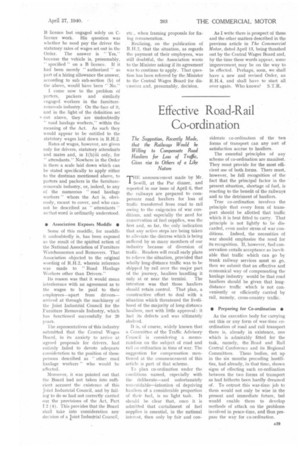Effective Road-Rail Co-ordination
Page 41

If you've noticed an error in this article please click here to report it so we can fix it.
The Suggestion, Recently Made, that the Railways Would be Willing to Compensate Road Hauliers for Loss of Traffic, Gives rise to Others of a Like Nature THE announcement made by Mr. 1 Sewill, at the Par dinner, and reported in our issue of April 6, that the railways are prepared to compensate road hauliers for loss of traffic transferred from road to rail owing to the exigencies of war conditions, and especially the need for conservation of fuel supplies, was the first and, so far, the only indication that any active steps are being taken to alleviate the distress which is being suffered by so many members of our industry because of diversion of traffic:. Readers will recall early plans to relieve the situation, provided that wholly long-distance traffic was to be shipped by rail over the major part of the journey, hauliers handling it
only at or near the termini. The intention was that those hauliers should retain control. That plan, a constructive effort to deal with a situation which threatened the livelihood of the majority of long-distance hauliers, met with little approval: it had its defects and was ultimately shelved.
It is, of course, widely known that a Committee of the Traffic Advisory Council is considering a memorandum on the subject of road and rail co-ordination in time of war. The suggestion for compensation mentioned at the commencement of this article is part of that scheme.
To plan co-ordination under the conditions named, especially with the deliberate—and unfortunately unavoidable—intention of depriving hauliers of a considerable proportion of their fuel, is no light task. It should be clear that, once it is admitted that curtailment of fuel supplies is essential, in the national interest, then only by fair and con siderate co-ordination of the two forms of transport can any sort of satisfaction accrue to hauliers.
The essential principles of any scheme of co-ordination are manifest. They must provide for the most efficient use of both forms. There must, however, be full recognition of the fact that the principal factor in the present situation, shortage of fuel, is reacting to the benefit of the railways and to the detriment of hauliers.
True co-ordination involves the principle that every form of transport should be allotted that traffic which it is best fitted to carry. That principle is not lightly to be discarded, even under stress of war conditions. Indeed, the necessities of war should emphasize the need for its recognition. If, however, fuel conservation entails acceptance as inevitable that traffic which can go by trunk railway services must so go, then we submit that an effective and economical way of compensating the haulage industry would be that road hauliers should be given that longdistance traffic which is not conveniently or efficiently carried by rail, namely, cross-country traffic.
• Preparing for Co-ordination • As the executive body for carrying out this or any form of war-time coordination of road and rail transport there is, already in existence, one which is admirably fitted for the task, namely, the Road and Rail Central Conference and its Regional Committees. These bodies, set up in the six months preceding hostilities, had already, in that time, shown signs of effecting such co-ordination between the two forms of transport as had hitherto been hardly dreamed of. To entrust this war-time job to then' would not only be wise in the present and immediate future, but would enable them to develop methods of attack on the problems involved in peace-time, and thus prepare the way for co-ordination.




































































